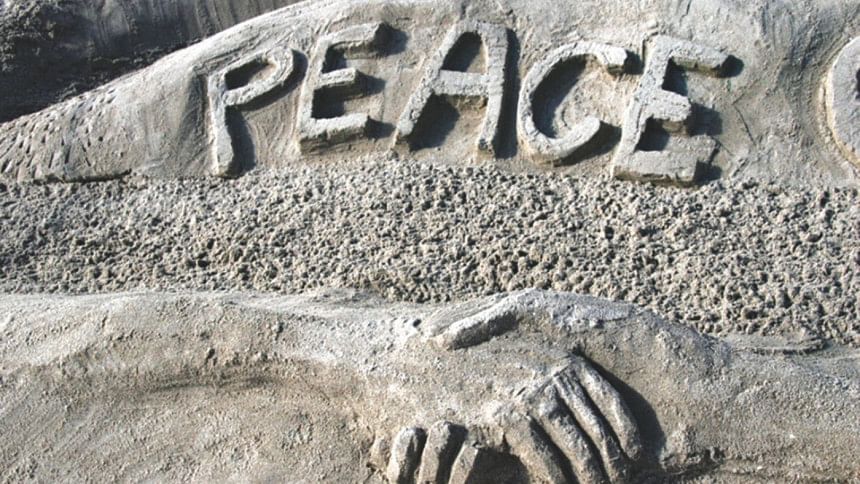Long walk to coexistence

Who would have thought that a car could be employed as an instrument of terror? Only twisted minds, demented spirits, and agents of evil can harness a seemingly innocuous vehicle to mow down innocent pedestrians going about their business…
August witnessed another spike in terrorist acts. First came the Charlottesville attack. This was followed by a copycat attack in Barcelona. In Charlottesville a 20-year-old man, linked to a white nationalist group, ploughed his car into a peaceful group of people protesting the assembly of white supremacists and fascists. A young woman was killed and several wounded. Days later a van rammed into a packed summer crowd in Barcelona's historic Las Ramblas district, killing 13 and leaving dozens more injured. While ISIS claimed responsibility for the latter attack, the driver was a 22-year-old Moroccan youth acting as a lone wolf. It would be a mistake to draw too neat a line across the two incidents, but similarities between Islamic terrorists like those in Spain and white nationalists like the man in Charlottesville are worth examining for what they reveal about the mutating nature of radicalisation across the globe.
Both acts of terror involved disgruntled young men radicalised by extremist ideas and the pervading culture of hate. British journalist Jason Burke, who has studied terrorism extensively, points to a commonality in the belief system of the Islamic State and America's far right—an overall "perverted sense of grievance." Burke suggests that anger over the loss of the Islamic caliphate may echo the Lost Cause of the Confederacy for the far right—not in real historical terms, but "as a mythic symbol of betrayal, of conviction and of what might, indeed should, have been." Whether we agree with this interpretation or not, the fact remains that terrorism has become a tool for discontented groups who believe that they have been wronged and denied what is "rightfully" theirs. The leaders of these groups have realised that isolated attacks—with an element of surprise—are easier to implement and have almost the same impact as big ones. Hence, they are "using" frustrated young people as instruments of terror by playing upon their basic insecurities. Unfortunately, the Internet and other communication aides tend to facilitate the dissemination of recruitment materials which in turn shape the actions of impressionable minds.
The prevailing threat posed by the Islamic State or far-right groups may eventually dissipate, but there is a high likelihood that it could morph into some other insidious cause. Hence, the danger posed by radicalised young men and women operating on the fringes of society and our difficulties in preventing them from being inducted into extremist causes is what should be a serious cause of worry, in the long term.
The encouraging reality is that human cooperation and kindness are more prevalent than bigotry, racism and hatred. The vast majority wish to live peacefully and lead meaningful lives. Most people feel empathy and compassion for their fellow human beings as is apparent from the spontaneous rallies and protests all over the world against terrorist and racist acts. There is no denying that pacifists may also harbour anger, jealousy or even hatred toward someone they perceive as an enemy, but rarely do they resort to violence against their opponents. Those who kill innocent people in cold blood are the outliers, for it takes a demented mind to deliberately run a car over innocent pedestrians. Hence, rather than labelling terrorists as Islamic radicals, white supremacists or neo Nazis let us accept that they all belong to the same group—they are psychologically disturbed individuals, unhinged by some internal or external evil force and motivated by hate.
I am no expert, but the idea that social inclusion, community outreach programmes and proactive counselling for the disenfranchised youth may diminish the spread of terrorism appeals to me. Experience relating to the so-called "War on Terror" shows that armed resistance, finger pointing or social isolation is quite ineffective in solving the problem. Most European countries seem to pursue a double track approach to terrorism—take resolute action when the threat or potential threat arises, but also devote a high priority to addressing the issues faced by the marginalised, emotionally disturbed and economically disempowered youth.
Those who believe in this enlightened approach are often criticised for being "weak on terrorism". But they can garner strength and conviction from Nelson Mandela's advice. Despite the long years of hatred and discrimination that he encountered, in his autobiography "Long walk to freedom" Mr Mandela notes: "No one is born hating another person because of the colour of his skin, or his background, or his religion. People must learn to hate, and if they can learn to hate, they can be taught to love, for love comes more naturally to the human heart than its opposite."
Milia Ali is a renowned Rabindra Sangeet exponent and a former employee of the World Bank.





Comments